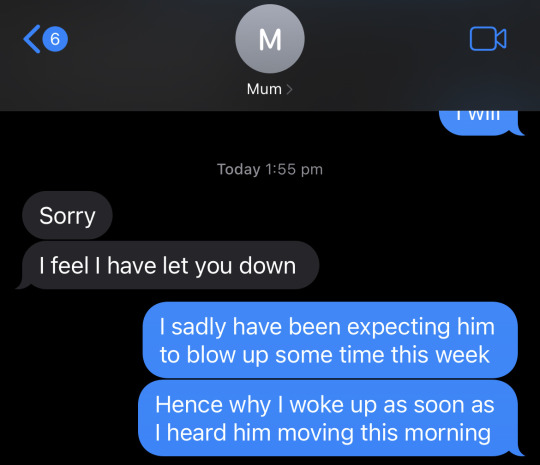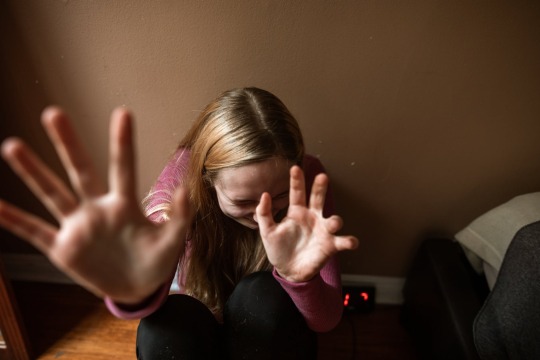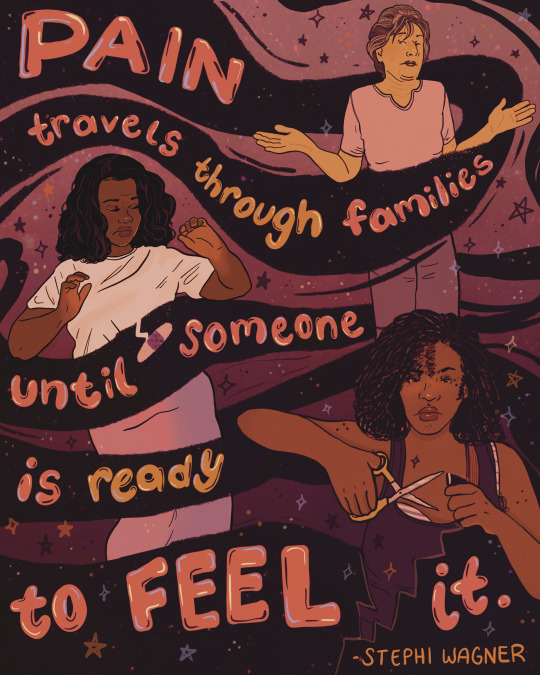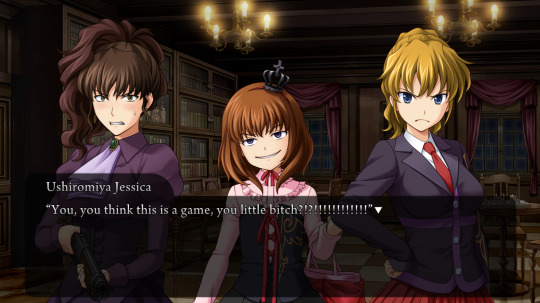#intergenerational abuse
Explore tagged Tumblr posts
Note
hi, transgenerational violence/abuse anon again. the resources were great, but i do have a question - does it have to involve ritual abuse, or is it also the cycle of abuse? does it just have to bounce from one generation to the other in order to be considered tv/a?
thank you
No, it doesn’t have to involve a spiritual belief.
Here are a few more links. Again, please let me know if you need more information and what sort.
Generational Abuse and Breaking the Cycle
Hurt People Hurt People:
Intergenerational Patterns of Child Maltreatment
Inter-generational Trauma
Oz
11 notes
·
View notes
Text
Losing empathy
Many don’t understand what it’s like to lose your empathy.
Years of being treated as a human punching bag both physically and emotionally leave me with nothing.
Being numb to everyone and everything going around you.
Tears still felt but never released.
Anger is all that remains.

#I swear some people have just should never of gotten married#tw violence#tw physical violence#tw abuse of power#tw ab*se#tw abandonment#mental health#2nd hand abuse#escape#intergenerational trauma#intergenerational abuse#late stage capitalism#personal rant#burnt out#depression at its finest#I wish I was living on my own#i feel like shit#i feel like crying#I need forever sleep
2 notes
·
View notes
Text
Excellent post about Intergenerational trauma. Kristina is both a victim of the system and an enforcer of it. She got all the rebelliousness ground out of her when she was younger, and she survived the process.
So now it’s her son’s turn to submit to the system. And she’ll nudge him along every step of the way. Because she’s retroactively decided that her parents and the royal court broke her spirit because they love her. So she has to express her love by doing the same to her son.
tbh we don't talk about the depiction of generational trauma in young royals enough. we see kristina lecture wille multiple times on the importance of keeping up an image, and how mistakes reflect on the entire family. erik, while a more positive figure in wille's life and more aware of his brother's anxiety, recites the same thing practically word for word. even when he's teasing wille about having a crush and encouraging him to hang out with simon, erik still tells wille to put on a persona for the rest of the school and mingle. in wille's fight with simon, he blurts out the same bs about his family's reputation etc. etc., but instantly regrets it when he starts to lose simon.
kristina's probably had the speech she teaches to her children drilled into her from a young age, since both she and erik had known from the start that they were the heirs. wille, as the "spare," has more doubts about these values and priorities, shown when he argues that he just wants a normal life in episode one. he actively pushes back against his family's demands right up until erik's death. wille's always idolized and admired his brother, so when the title of crown prince and its responsibilities are passed to him, so is the pressure to adhere to the crown's tradition.
the show does a great job of showing that even though wille really, really wants to break free for simon and for himself, all it takes is one short conversation with his mother from the cycle to drag him right back in. generational trauma is never easy to break free from, much less when you're an anxiety-ridden teenager with the weight of a country on your shoulders, unprocessed grief from losing your brother, and on top of that, the added trauma of just being outed in the worst way possible. kristina even tells him about her own "unfortunate romance" that ended because she was taught to choose the crown over everything else.
#queen Kristina#intergenerational trauma#young royals#queue#wilmon#prince wilhelm#family young royals#Kristina analysis#burning down the monarchy#Pernilla August#young royals analysis#Prince wilhelm analysis#character analysis young royals#rebellion young royals#rebellious wilmon#conformity young royals#hierarchy young royals#succession young royals#jan olof#royal court#Ludvig#Intergenerational abuse#obedience young royals#obedient wilmon#image young royals#wilmon image#publicity young royals#media young royals#public young royals
529 notes
·
View notes
Text
Breaking the Cycle of Abuse: Understanding and Preventing the Cycle
Breaking the Cycle of Abuse: Understanding and Preventing the Cycle. The cycle of abuse is a devastating pattern that perpetuates harmful behaviors across generations. It involves a recurring cycle of abuse where individuals who have experienced abuse as children may become abusers themselves as adults. In this blog post, we will delve into the concept of the cycle of abuse, its effects, and…

View On WordPress
#Abuse prevention strategies#Breaking the cycle for future generations#Breaking the cycle of abuse#Cycle of abuse#Early intervention for abuse#Effects of abuse#Intergenerational abuse#Intervention for abuse victims#Mental health services for abuse survivors#Parenting education and abuse prevention#Preventing abuse#Protective factors against abuse#Reporting abuse
0 notes
Text

Your feelings are valid on too. Special shoutout to all the cycle breakers. 💐
Created with Mother Wound Project
Digital illustration depicting three generations of women with a ribbon linking all of them. The scene includes an elderly Latina woman shrugging, a middle-age Afrolatina woman dodging the ribbon & her daughter cutting the ribbon. Text reads, “pain travels through families until someone is ready to feel it” by Stephi Wagner
#art#feminism#trauma#intergenerational trauma#mother wound#mommy issues#childhood trauma#tw trauma#tw child abuse
2K notes
·
View notes
Text
the way the absence of john winchester haunt sam and dean in ways that are more real than any ghost they have ever faced. the way john echoes so loudly in the narrative even in episodes he’s not mentioned, in seasons where he never appears. the way john possesses dean when he’s angry and sam when he’s grieving. the way john is the one true god of the narrative, the absent father who does not answer prayers or phone calls. the righteous man who does not break in hell but breaks down and hands his child a gun. john and the memory of his holy mary. john the prophet and his sacred text. john and his prodigal son that he knows has to die.
#john winchester#john as a character and narrative tool is so fascinating to me#the way the show utilizes both his presence and absence#the intergenerational trauma and cycle of abuse stuff is what elevates the show#even when the writers are fumbling the motw stuff or the season arcs#the impact of john is still so apparent and raw and visible#a lot of that is on the actors vs the writers tho#john winchester hate club#supernatural#sam winchester#dean winchester#SPN
1K notes
·
View notes
Text
You ever notice how Blitz and Stolas were so traumatized by their fathers that they went too far in the other direction, accidentally hurting their daughters in the process?
Blitz was physically abused, the family scapegoat, constantly made to feel worthless, and taught from a young age that he’s only worth the money he can provide? So he’s overly doting and protective of Loona. He never lectures her, even when she’s causing trouble, because he doesn’t want to upset her and make her feel worthless or disposable. He won’t let her have a boyfriend, despite the fact that she’s an adult. He borderline infantilizes her.
Stolas is more a product of neglect and while he had a better time raising Via, it’s easier to raise a kid that you’ve had from birth as opposed to one you adopted only a month before they aged out of foster care. But he still swung too violently in the opposite direction. He has no boundaries with her. He protects her from the wrong threats (the knowledge of his abuse as opposed to the abuser, herself). It looks like she’s home schooled, so he still hasn’t worked out that the extreme isolation he suffered is a large part of why he’s Like This. He’s spent so much time attending to her every whim that when he decides it’s time to start chasing his own happiness, she can’t empathize because she was his happiness.
It’s a great depiction of intergenerational trauma. Both of them are trying so hard to never make their daughters feel as awful as they felt, but they’re scarring their daughters in different ways.
#stolas#blitzø#loona#octavia#helluva boss#intergenerational trauma#tw abuse#tw child abuse#tw neglect
229 notes
·
View notes
Text
I reread Fruits Basket for the first time since I read it as a kid. It's even more compassionate of a series than I remember it to be. I'm thinking about how, despite everything that happens in it, it isn't really about forgiveness. Honestly, it's not even about making amends. It's about letting go.
Fruits Basket is saying that the only real way to heal from the trauma and cycles of abuse is to let go. Let go of the guilt that is a normal symptom of being in a traumatic situation that you had no control over (Like Hiro, for example). Let go of the anger that's been keeping you alive and find something else to keep you going (Like with Rin). Let go of the shame and fear that you've learned to feel when getting close to people (Like Kyo).
It's about letting go of the idea that the people who wronged you need to be punished in order for you to move on. It's also about letting go of the need to feel forgiven or redeemed in order to become a better person. We can all agree that victims of abuse have to find a way to move forward, for their own sake. Fruits Basket says that the same has to be applied to abusers and anyone who's done something to hurt others, if they are to have any hope of not hurting anyone else in the future.
And I know a lot of people would argue against that message and say that it's "letting abusers off the hook". But you know, if the idea of your abuser continues to bring you anger and the thought of their suffering brings you satisfaction... are you really free from their influence? If freedom is a lack of connection between between people, then by clinging to these emotions, aren't you still, in some ways, bound to them, cursed to carry this emotion-based connection to them into future relationships?
#fruits basket is an allegory for breaking free of intergenerational trauma and cycles of abuse#i think that's what i've been trying to say#furuba
17 notes
·
View notes
Text
Never being able to fit in fucks with a person deeply
#thad says something#thad vents#actually autistic#neurodivergent#audhd#actually traumatized#autism#isolation#peer abuse#autism and trauma#social isolation#neurodiversity#vent post#please interact#family trauma#intergenerational trauma
38 notes
·
View notes
Text
also the way these writers go for "my sister was my daughter" they are salivating over lestat/gabrielle they are so. excited. if we get next season i'm going to be watching through my fingers.
#press says iwtv#cw: incest#can i say something controversial. i fucking hate intergenerational incest#i think in the book it's handled well and so fucking sad and awful but i am wincing my way through every time#i know they're going to be like lestat drove her away because he's annoying and :(#that's not actually what happened what happened was an abused teenager in a misogynistic society was entirely unsuited for motherhood#but it kept happening to her over and over and over#and she loved her last child and saw so much of herself in him#but the best she could do for him was tell him to run#set him free! and that freedom killed him#what to do what to do#like i am not immune to the horror show peek through fingers yell gross ruminate ruminate cycle#such is gothic horror#interview with the vampire
23 notes
·
View notes
Text
ultimately boys for pele is my preacher’s daughter bc the problem with preacher’s daughter is ethel cain made it sound too pretty for the subject matter it covers and it attracted i think a wider audience than can actually relate to any of what that album is about at all
#i think an album that deals with the abuse and intergenerational trauma that patriarchal religions sanction should sound ugly#like it shouldn’t be pretty to listen to it shouldn’t lend itself to romanticization#i think boys for pele sounds the way the lyrics feel. it doesn’t let you escape from that pain and anger it makes you sit with it
16 notes
·
View notes
Text
i think a heartbreaking thing about carmy and mikey, as well as a lot of people with loved ones suffering from addiction, is that carmy didn’t realize he was an addict. but that’s not fully because of his reasoning of “i was never here, i never saw him”, but also because it’s clear carmy didn’t want to believe it. I don’t know how he could’ve sat through that dinner, hearing lee basically accuse mikey of being high and the behavioral changes of mikey, and not realize that there was something going on. it’s easy for carmy, who comes from a family of addicts, to not want to believe that the same thing is happening to his brother. his best friend. so he ignores the obvious, he overlooks the signs during that dinner, presumably during any time he saw mikey recently. he didn’t know mikey was using, but i know he’s retroactively thinking of all the signs he missed or didn’t want to think too much about.
#Carmy berzatto#mikey berzatto#the bear#idk i just think about this. Carmy asking richie if he knew mikey was using and mikey#just saying how could you not??#they were all at that dinner. Lee said I don’t know what you’re ON but if you can hear me through the fog-#Carmy’s denial as a victim of intergenerational addiction and abuse ……
48 notes
·
View notes
Text
There are many violent neurodivergent people. This violence is usually caused by the medical model of disability and not because of their neurotype.
Society likes to scape goat disabled people for violent behavior. That school shooter was mentally ill, my abuser was a narcissist, oh there is a link between childhood trauma and criminality. Intergenerational trauma is caused by mentally ill people abusing each other.
No where along the line is society as a whole hold accountable. Sometimes a mentally ill person does harmful stuff because of the medical model and childhood trauma. Sometimes they are just an abusive asshole.
However no matter what the reason for a mentally ill person behavior is it does not change the fact that you benefit from the medical model of disability.
That it is a privilege not to have OCD, autism, ADHD, DID and any other number of neurotypes.
#neurodiversity#ableism#leftism#school shooters#narc abuse does not exist#mental illness#autism#medical model#npd#narcissistic abuse#narcissistic personality disorder#intergenerational trauma
41 notes
·
View notes
Text

this study scene is actually a fantasy illusion by beatrice to get the reader to hate every member of the family so much that they will not be as upset when she kills them all.
#umineko liveblog#i'm half joking but not really#this exact moment is pressuring you to go 'fuck you jessica'#but compare this to the garden scene with rosa and how that was infinitely worse#and yet you were still invited to understand the how and why of rosa and the abuse as one spoke in a wheel of tragedy#rosa was not inherently evil she was just an iteration of a pattern of violence#but we were invited to have consideration for rosa. but in the study our thinking is being closed off#it's the horror as antithesis to mystery effect in play again#what we are actually seeing is everyone writhing in the barbed wire net of intergenerational abuse and trauma#in the room where kinzo's aura rules kinzo's influence is at its strongest#beatrice and kinzo have been set up as dichotomous. if you are not succumbing to one you are succumbing to the other#the only way to escape beatrice is to become the worst version of themselves#it's Detective/Romantic in its nastiest form
30 notes
·
View notes
Text
“aha, but geralt of rivia is not a tomato.”
— very funny joke i made in a dream that made total sense in context
#to clarify the tomatoes had suffered child abuse and there was a huge intergenerational conflict#the elbow-high diaries#weird dreams but the hanza showed up later so im not complaining :)
10 notes
·
View notes
Text
ok but real talk having a grandparent who was super chill when you were a kid n then finding out they abused your parent as a kid in basically all the ways your parent ended up abusing you...... like

#cw child abuse#local woman discovers that intergenerational trauma is intergenerational#like nana i trusted you
4 notes
·
View notes